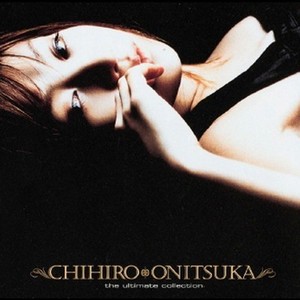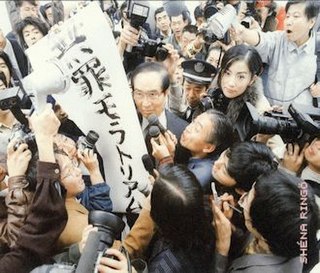
Shadow of the Moon is the debut studio album by the group Blackmore's Night, released June 2, 1997. It stayed on the German charts for 17 weeks. It received a gold certification in Japan for 100,000 albums shipped to stores.
Chihiro Onitsuka is a Japanese singer-songwriter.

The Ultimate Collection is the first compilation album by Japanese singer-songwriter Chihiro Onitsuka, released in 2004. It came out months after the artist terminated the contracts with record label and management office.

Short Stories is the 28th studio album by Japanese singer-songwriter Miyuki Nakajima, released in November 2000. The album features commercially successful double A-Side single "Earthly Stars "/"Headlight, Taillight", which became the number-one hit in later years and sold more than a million copies in Japan alone.
The discography of Japanese singer Mai Kuraki consists of twelve studio albums, five compilation albums, two remix albums, nineteen video albums, and forty-six singles. Kuraki debuted in 1999, while she was still in high school, through Giza Studio. The label initially marketed Kuraki in the United States under the name Mai K, and released the single "Baby I Like" (1999). However, the single was a commercial failure which prompted the label to send her back to Japan. There, they released her single "Love, Day After Tomorrow", which peaked at number two on the Oricon Singles Chart and was certified million by the Recording Industry Association of Japan (RIAJ). The second single, "Stay by My Side" became her first number one single on the chart. Kuraki's debut album, Delicious Way, topped the Oricon Albums Chart and was certified triple million by the RIAJ.

Muzai Moratorium (無罪モラトリアム), also known as Innocence Moratorium, is the debut studio album by Japanese singer and songwriter Ringo Sheena, released on February 24, 1999 by Toshiba EMI. The album debuted at #2 and has sold over 1,433,000 copies. The album was certified triple platinum by the RIAJ for 1,200,000 copies shipped. The album was named number 3 on Bounce's 2009 list of 54 Standard Japanese Rock Albums.

Insomnia is the debut album by Japanese singer-songwriter Chihiro Onitsuka, released in March 2001. The album features acoustic-oriented production arranged by Takefumi Haketa, who produced all her studio albums released under the Virgin Tokyo label distributed by Toshiba EMI. It comprises 11 tracks written by Onitsuka, including hit singles "Cage", "Edge", "Memai", and her most well-known and successful song "Gekkō."

This Armor is the second studio album recorded by Japanese singer-songwriter Chihiro Onitsuka, released in March 2002. It features two lead singles "infection", "Ryūseigun", and remake versions of "Arrow of Pain" and "Little Beat Rifle".

"Kōfukuron" is the debut single by Japanese singer Ringo Sheena and it was released on May 27, 1998 by Toshiba EMI, East World. Since Sheena suddenly gained popularity, it was decided that this single was resold as a 12 cm single. New edition, including the new song, was re-released with the fourth single "Honnō" on October 27, 1999. The 1999 edition was certified gold by the RIAJ for 200,000 copies shipped to stores.

"Honnō" is Japanese singer Ringo Sheena's 4th single and it was released on October 27, 1999 by Toshiba EMI / East World. The single was certified double platinum by the RIAJ for 800,000 copies shipped to stores, and later gold for 100,000 downloads to cellphones in 2011.

"Gips" is Japanese singer Ringo Sheena's 5th single and it was released on January 26, 2000 by Toshiba EMI / Virgin Music. The single was certified double platinum by the RIAJ for 800,000 copies shipped to stores and later gold for 100,000 downloads to cellphones in 2010.
The discography of Chihiro Onitsuka consists of six studio albums, one cover album, five compilation albums, 20 singles and seven video albums. These were released under Toshiba EMI between 2000 and 2003, Universal Music Japan from 2004 to 2010, For Life Music Entertainment from 2011 to 2012, and on her personal record label, Napoleon Records, from 2013.

"Irohanihoheto" (いろはにほへと), also known by its French title "Les Couleurs Chantent", is a song by Japanese musician Ringo Sheena. It was initially released digitally on April 30, 2013, and on May 27 released as one of the A-sides of her 14th single, along with the song "Kodoku no Akatsuki". The release date was the 15th anniversary of the release of Sheena's debut single "Kōfukuron" in 1998. The song was used as the theme song for the drama Kamo, Kyōto e Iku.: Shinise Ryokan no Okami Nikki.

"Nippon" is a song by Japanese musician Ringo Sheena. It was released as a single on June 11, 2014, two weeks after her self-cover album Gyakuyunyū: Kōwankyoku and a year after her previous solo single "Irohanihoheto" / "Kodoku no Akatsuki". The song is being used as the 2014 soccer theme song for NHK.

"Kodoku no Akatsuki" is a song by Japanese musician Ringo Sheena. It was released as one of the A-sides of her 14th single, along with the song "Irohanihoheto", released on May 27, 2013. The release date was the 15th anniversary of the release of Sheena's debut single "Kōfukuron" in 1998.
"Shun" is a song by Japanese musician Ringo Sheena. It was the leading promotional song for her fourth album Sanmon Gossip. It was digitally released on June 1, 2009, a month before the release of the album and at the same time as Sheena's song "Futari Bocchi Jikan".

Hi Izuru Tokoro, also known as Sunny, is a fifth studio album by Japanese musician Ringo Sheena released on November 5, 2014 by Universal Music Japan sublabel Virgin Records. It is a compilation studio album compiling singles released since 2009 as well as new compositions.

"Orphans no Namida" is a song recorded by Japanese singer Misia. It was released on 25 November 2015 by Ariola Japan as the fifth and final single from her twelfth studio album, Love Bebop (2016). Misia wrote the lyrics and Shirō Sagisu composed, arranged and produced the track. "Orphans no Namida" serves as the first ending theme to the 2015 anime series Mobile Suit Gundam: Iron-Blooded Orphans. In commemoration of the 70th postwar broadcast, Misia performed the album version of "Orphans no Namida" at the 66th NHK Kōhaku Uta Gassen, live from the Nagasaki Peace Park.

"Gekkō" is a song by Japanese singer-songwriter Chihiro Onitsuka from her debut album Insomnia (2000). It was released on August 9, 2000 as the album's second single. The song is mostly known for serving as a theme song to the Japanese television drama series Trick. The single peaked at number eleven on the Oricon Weekly Singles chart and remains as Onitsuka's best-selling single.

Sandokushi also known as triviṣa-itihāsa, is the sixth studio album by Japanese musician Ringo Sheena released on May 27, 2019 by Universal Music Japan. Similarly to her previous studio album Hi Izuru Tokoro (2014), the album is a compilation studio album compiling singles released from 2014 to 2019, as well as new compositions.

















